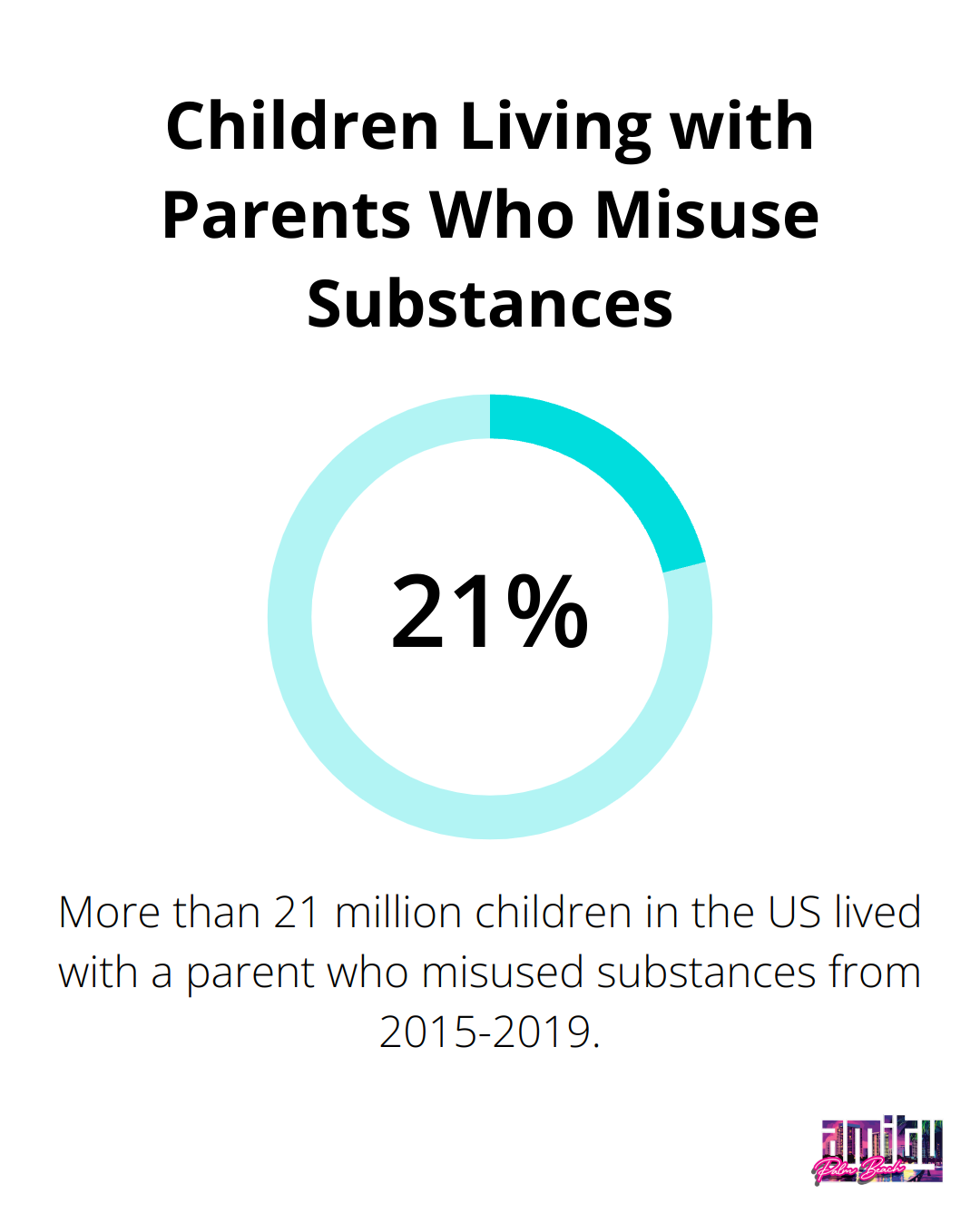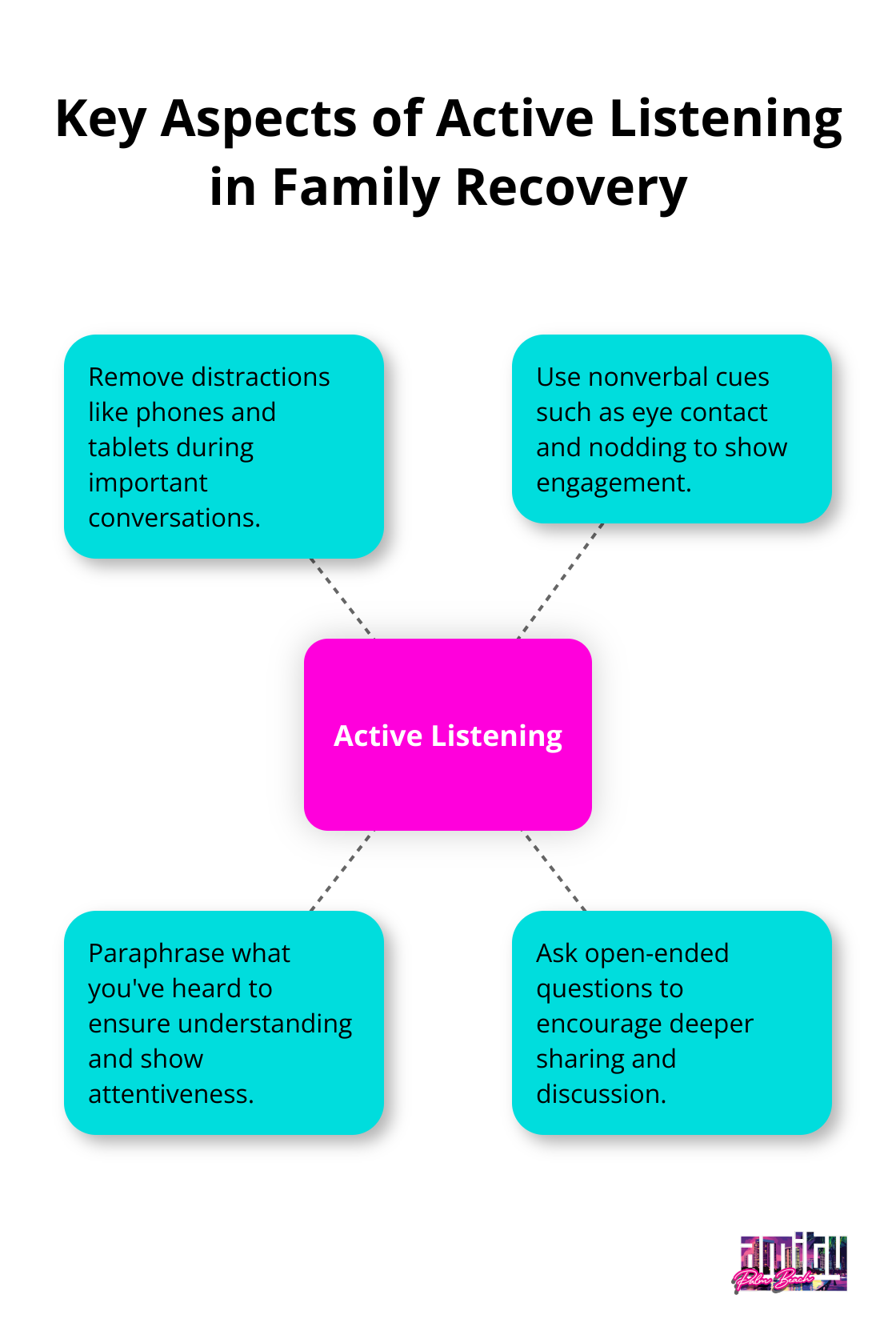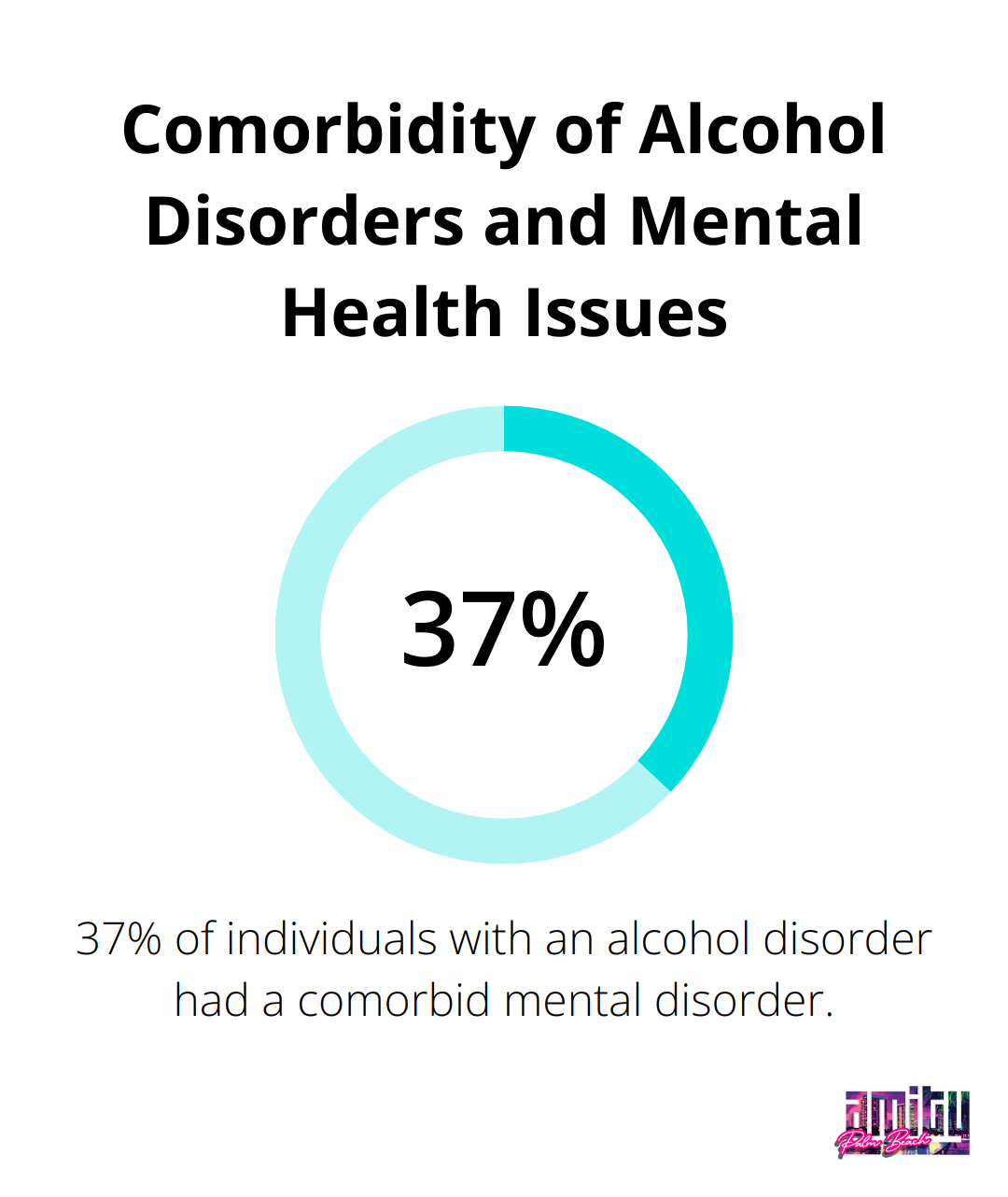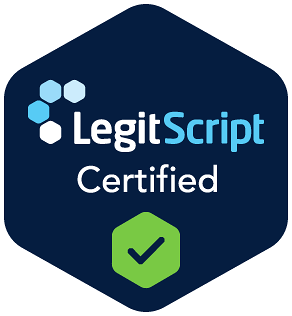Addiction doesn’t just affect individuals; it impacts entire families. At Amity Palm Beach, we’ve seen firsthand how family recovery plays a crucial role in the healing process.
This blog post explores essential strategies for families navigating the challenges of addiction recovery together. We’ll cover effective communication techniques, practical support methods, and the importance of self-care in the family healing journey.
How Addiction Impacts Family Systems
The Ripple Effect of Addiction
Addiction extends far beyond the individual struggling with substance use. It ripples through entire family systems, altering dynamics and creating unique challenges for everyone involved. Roles often shift as family members try to compensate or cope. Children may take on adult responsibilities, while partners might become caretakers or enablers. These changes can lead to resentment, anxiety, and strained relationships.
More than 21 million children in the United States lived with a parent who misused substances in an average year from 2015–2019. This exposure can have long-lasting effects on their emotional development and future relationships.

Common Challenges in Family Recovery
Families in recovery face numerous obstacles. Trust, often severely damaged during active addiction, requires time and consistent effort to rebuild. Financial strain from treatment costs or job loss can add significant stress. Emotional exhaustion is common as family members navigate their own feelings while supporting their loved one’s recovery.
Communication breakdowns frequently occur. Years of dishonesty or manipulation related to substance use can make open dialogue difficult. Learning new, healthy communication patterns becomes essential but challenging work for many families.
The Power of Family Involvement
Family participation in the treatment process is not just helpful – it often proves essential for long-term recovery success. Family involvement can significantly improve treatment outcomes and reduce the risk of relapse. The incorporation of family members in the treatment of substance abuse produces benefits by diminishing consumption and improving family functioning.
Family therapy and education programs empower relatives with the tools to support recovery effectively. These interventions help family members understand addiction as a disease, recognize enabling behaviors, and learn healthy coping strategies.
Involving families also addresses the generational aspect of addiction. Healing family systems and breaking dysfunctional patterns can help prevent the cycle of addiction from continuing to future generations.
Rebuilding Family Connections
Recovery offers an opportunity to rebuild and strengthen family bonds. This process requires patience, commitment, and a willingness to change longstanding patterns. Families can learn to:
- Practice open and honest communication
- Set healthy boundaries
- Develop trust through consistent actions
- Support each other’s individual growth and healing
As families work together in recovery, they often discover newfound resilience and deeper connections. This collaborative healing process can transform not only the individual struggling with addiction but the entire family unit.
How Families Can Communicate Better in Recovery
Effective communication forms the foundation of family healing during addiction recovery. At Amity Palm Beach, we’ve witnessed how improved communication transforms family dynamics and supports long-term sobriety. Here are practical strategies families can use to foster understanding and rebuild connections:
Master Active Listening
Active listening involves fully engaging with the speaker and demonstrating that you value their perspective. Try these techniques:
- Put away distractions (phones, tablets) during important conversations.
- Make eye contact and use nonverbal cues like nodding to show engagement.
- Paraphrase what you’ve heard: “So what I’m hearing is…”
- Ask open-ended questions to encourage deeper sharing.
Research shows that the active listener can experience benefits such as reduced defensiveness and increased motivation to change.

Express Feelings with “I” Statements
When discussing sensitive topics, use “I” statements to express your feelings without placing blame. For example, instead of saying “You always make me angry when you relapse,” try “I feel worried and hurt when a relapse occurs.” This approach reduces defensiveness and opens the door for more productive conversations.
Establish Clear, Respectful Boundaries
Setting healthy boundaries is essential for family recovery. Be specific about acceptable and unacceptable behaviors. For instance, “I will not lend money for drug use, but I will help you find treatment resources.” Communicate these boundaries calmly and consistently.
Boundaries protect both the individual in recovery and their loved ones. They’re not punishments, but guidelines that promote healing and respect.
Rebuild Trust Through Consistent Actions
Rebuilding trust takes time and patience. Focus on small, consistent actions that demonstrate reliability and honesty. This might include:
- Following through on commitments (no matter how small).
- Being transparent about whereabouts and activities.
- Admitting mistakes promptly and taking responsibility.
- Sharing progress in recovery openly.
The Substance Abuse and Mental Health Services Administration emphasizes that trust-building is a gradual process. Celebrate small victories along the way.
Practice Family Meetings
Regular family meetings provide a structured time for open communication. Use this time to:
- Share updates on recovery progress and challenges.
- Discuss issues affecting the family.
- Plan positive activities to do together.
- Express gratitude and acknowledge each other’s efforts.
Keep these meetings positive and solution-focused. If tensions rise, take a break and return when everyone is calmer.
Implementing these communication strategies can create a supportive environment that nurtures recovery and strengthens bonds. Patience is key as families navigate this journey together. The next chapter will explore practical steps for supporting a loved one’s recovery, building on the communication foundation we’ve established.
How Families Can Actively Support Recovery
Educate Yourself on Addiction and Treatment
Knowledge empowers families to support recovery effectively. We recommend:
- Attend educational workshops offered by treatment centers or community organizations.
- Read reputable books and online resources about addiction science and recovery processes. The Substance Abuse and Mental Health Services Administration (SAMHSA) offers free, evidence-based materials.
- Learn about co-occurring mental health conditions. Among those with an alcohol disorder, 37% had a comorbid mental disorder, according to the Journal of the American Medical Association.

Create a Recovery-Friendly Home Environment
Transform your home into a safe haven for recovery:
- Remove all drugs and alcohol from the premises, including items like mouthwash containing alcohol.
- Establish a quiet space for meditation or reflection. Studies show that mindfulness practices reduce cravings and prevent relapse.
- Stock healthy foods and create opportunities for physical activity. Proper nutrition and exercise significantly improve recovery outcomes.
Encourage Participation in Support Systems
Recovery thrives on connection. Families should:
- Offer transportation to therapy appointments, support group meetings, or outpatient programs.
- Consider attending open meetings of groups like Al-Anon or Nar-Anon.
- Help research and connect with alumni programs from treatment centers.
Recognize and Avoid Enabling Behaviors
Enabling hinders recovery progress. Families must:
- Stop covering up or making excuses for addiction-related behaviors.
- Refuse to provide money that could be used for substances. Instead, offer direct assistance with necessities.
- Learn to say “no” and stick to established boundaries.
Prioritize Self-Care and Personal Well-being
Supporting recovery can be emotionally taxing. Family members should:
- Attend individual therapy or support groups. Family members who engage in their own therapy show improved mental health and better support their loved ones.
- Practice stress-reduction techniques like yoga or deep breathing.
- Maintain personal interests and social connections outside of the recovery process.
Final Thoughts
Family recovery requires dedication, patience, and support. We at Amity Palm Beach understand the challenges families face during addiction recovery. Our comprehensive treatment programs incorporate family involvement, recognizing the vital role loved ones play in the healing process.
Professional help can make a significant difference in your family’s journey. Our team at Amity Palm Beach provides the support and resources you need to navigate this challenging path. We offer expert guidance to help families not only recover from addiction’s impacts but emerge stronger and more connected.
Your family’s recovery journey starts with taking that first step together. With the right strategies and commitment to healing, families can overcome addiction’s challenges. Don’t hesitate to reach out for support – we’re here to help you move forward on this rewarding path.




